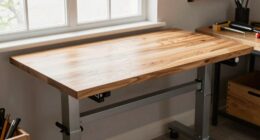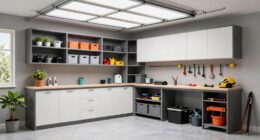To choose the right generator for your home projects, consider your fuel preferences, noise sensitivity, and project size. Gasoline models are portable but louder, while propane and natural gas units burn cleaner and run longer. Diesel generators are heavy-duty but noisier and larger. If quiet operation matters, look for models with sound-dampening features. Exploring your options further helps you find the best fit for your needs and environment.
Key Takeaways
- Assess your project size and power needs to select a generator with appropriate wattage capacity.
- Choose a fuel type (gasoline, propane, diesel, natural gas) based on availability, maintenance, and run-time requirements.
- Consider noise levels; opt for low-noise models if operating in neighborhoods or sensitive environments.
- Determine if portability or permanent installation suits your setup, influencing size and fuel options.
- Match the generator’s features, such as sound-dampening and efficiency, to your specific project and environmental considerations.

When you’re tackling home projects that require reliable power, choosing the right generator is vital. You need a device that can handle your workload without becoming a nuisance or risking safety. One of the first things to contemplate is fuel types. Generators run on various fuels, including gasoline, propane, diesel, and even natural gas. Gasoline generators are common because they’re portable and easy to find, but they often require more maintenance and have shorter run times. Propane and natural gas generators tend to burn cleaner, produce less engine wear, and can often run longer, especially if you have a steady supply of fuel. Diesel generators are more durable and efficient for heavy-duty use, but they tend to be larger, louder, and sometimes more expensive upfront. Your choice should depend on your project’s scope, budget, and fuel availability. For instance, if you need a generator for occasional light work, gasoline or propane might be sufficient. Conversely, if you’re planning extensive projects or want a unit with longer run times, a diesel model could be more practical.
Another vital factor is noise levels. Generators can be loud, which might disturb your household, neighbors, or even your own concentration. Consider how much noise is acceptable for your environment. Some models are specifically designed to operate quietly, often marketed as “low-noise” generators, and they can be a good fit if you’re working in a neighborhood or during early mornings or late evenings. The noise level is usually measured in decibels (dB); lower numbers mean quieter operation. For example, a generator that produces around 60 dB is comparable to normal conversation, while one at 70 dB might sound like a vacuum cleaner. When selecting a generator, think about where you’ll be using it and the potential impact on your surroundings. If quiet operation is a priority, look for models with sound-dampening features or those explicitly rated for lower noise levels.
Frequently Asked Questions
How Do I Calculate My Home Power Needs Accurately?
To accurately calculate your home power needs, start with a detailed load calculation. List all appliances and devices, noting their power consumption in watts. Add up these figures to determine your total load. This helps you understand your power needs and guarantees you select a generator with the right capacity. Regularly review and update your load calculation, especially if you add new appliances or make changes to your home.
What Safety Features Should I Look for in a Generator?
Think of safety features as your generator’s armor—crucial for protection. Look for automatic shutoff systems that activate during overloads, ensuring safety like a guardian angel. Prioritize low noise levels to keep your peace, and check for sturdy fuel efficiency mechanisms to prevent accidents. These features safeguard your home and loved ones, turning your generator into a reliable partner that works quietly and efficiently when you need it most.
Can I Run a Generator Indoors Safely?
You shouldn’t run a generator indoors because it poses serious safety risks. Generators produce carbon monoxide, which can accumulate without proper indoor ventilation, leading to dangerous poisoning. Plus, noise levels inside can be overwhelming and harmful. Always operate your generator outdoors in a well-ventilated area, away from windows and vents, to guarantee safety and prevent carbon monoxide buildup. Never compromise on proper ventilation or noise management.
How Often Should I Perform Maintenance on My Generator?
Did you know that neglecting generator maintenance can reduce its lifespan by up to 50%? You should follow a regular maintenance schedule, ideally every 6 to 12 months, depending on usage. This includes checking oil levels, replacing filters, and managing fuel properly. Proper fuel management prevents clogs and corrosion, ensuring your generator runs smoothly when you need it most. Stay proactive to keep your power source reliable.
Are There Eco-Friendly or Solar-Powered Generator Options?
You’re curious about eco-friendly or solar-powered generator options. These renewable energy generators use solar panels to harness sunlight, reducing emissions and reliance on fossil fuels. Many models now incorporate battery storage, so you can store excess energy for later use. This makes them ideal for backup power during outages or outdoor projects. Investing in a solar generator helps you stay eco-conscious while enjoying reliable, clean energy wherever you need it.
Conclusion
Choosing the right generator guarantees your home projects run smoothly and safely. Remember, about 60% of homeowners experience power outages annually, highlighting the importance of reliable backup power. By selecting a generator suited to your needs, you can confidently tackle projects without interruption. Take the time to assess your power requirements and invest wisely—it’s a small step that makes a big difference in keeping your home running seamlessly during emergencies.









